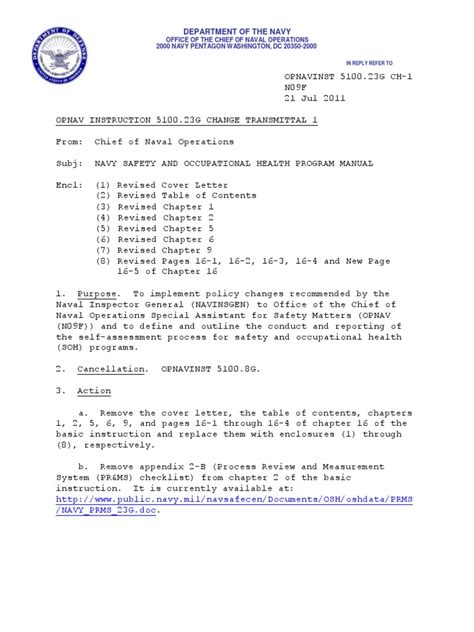The Simple Truth About Supervisory Personnel: OPNAVINST 5100.23E
OPNAVINST 5100.23E, "Department of the Navy Directives and Instructions," isn't solely focused on supervisory personnel. It's a broad, overarching instruction covering numerous aspects of Navy administration. However, within its extensive guidelines, significant sections address the responsibilities, roles, and expectations of supervisory personnel in the Navy. This article will delve into the key aspects relevant to supervision as outlined (directly or indirectly) within the instruction and offer a clear, concise understanding of the subject. Note that OPNAVINST 5100.23E is a living document, subject to change, so always refer to the most current version for definitive information.
What is OPNAVINST 5100.23E and Why is it Important for Supervisors?
OPNAVINST 5100.23E serves as a central repository of directives and instructions governing various aspects of Navy operations. While it doesn't exclusively deal with supervision, it's crucial for supervisors because it outlines the framework within which they operate. The instruction touches upon many areas indirectly influencing supervisory practices, including:
- Personnel Management: The instruction addresses personnel policies, procedures, and regulations directly impacting how supervisors manage their teams. This includes assignment, promotion, evaluation, and disciplinary actions.
- Equal Opportunity: OPNAVINST 5100.23E reinforces the Navy's commitment to equal opportunity and fair treatment for all personnel, placing a significant responsibility on supervisors to foster an inclusive and respectful work environment. Failure to uphold these standards can lead to severe repercussions.
- Safety and Security: The instruction incorporates safety and security regulations, making supervisors responsible for ensuring their teams adhere to these standards to prevent accidents and maintain operational security.
- Training and Development: Supervisors are crucial in ensuring their personnel receive the necessary training to perform their duties effectively and safely. The instruction guides the processes and resources available for training.
- Accountability: Ultimately, supervisors are accountable for the performance and conduct of their subordinates. OPNAVINST 5100.23E establishes the framework for this accountability, outlining reporting procedures and responsibilities.
What are the Key Responsibilities of Supervisory Personnel as Per (or Implied by) OPNAVINST 5100.23E?
While not explicitly detailing a "Supervisor's Handbook," the instruction implicitly outlines numerous crucial responsibilities:
1. Leading and Motivating: Effective leadership is paramount. Supervisors must inspire their teams, foster teamwork, and create a positive work environment. This involves clear communication, providing constructive feedback, and recognizing individual contributions.
2. Training and Development: Supervisors are responsible for ensuring their personnel are properly trained and developed. This includes identifying training needs, arranging for appropriate training, and mentoring subordinates to enhance their skills and capabilities.
3. Performance Management: Regular performance evaluations are crucial. Supervisors must provide fair, objective assessments of their subordinates' performance, offering constructive criticism and identifying areas for improvement.
4. Maintaining Discipline: Supervisors must enforce Navy regulations and maintain discipline within their teams. This involves addressing misconduct promptly and fairly, ensuring consistency and adherence to established procedures.
5. Ensuring Safety: A safe working environment is essential. Supervisors must ensure their teams follow safety regulations and take appropriate precautions to prevent accidents and injuries.
6. Adhering to Equal Opportunity Policies: Supervisors must actively promote equal opportunity and prevent discrimination within their teams. This includes creating an inclusive environment where all personnel are treated fairly and respectfully, regardless of race, religion, gender, or other protected characteristics.
What Happens if Supervisory Personnel Fail to Meet Expectations?
Failure to meet the expectations outlined (directly or indirectly) within the framework of OPNAVINST 5100.23E and related directives can lead to a range of consequences, from formal counseling to administrative actions, and potentially even legal repercussions depending on the severity of the infraction. These consequences may include:
- Formal Counseling: A verbal or written warning highlighting deficiencies.
- Disciplinary Actions: Depending on the severity of the misconduct, this could involve non-judicial punishment (NJP) under the Uniform Code of Military Justice (UCMJ).
- Loss of Privileges: This might include loss of promotion opportunities or other benefits.
- Administrative Separation: In severe cases, this may lead to discharge from the Navy.
Conclusion
While OPNAVINST 5100.23E isn't a dedicated manual for supervisors, it forms the crucial foundational regulatory framework within which Navy supervisors operate. Understanding its implications, even indirectly, is vital for effective leadership, maintaining a positive work environment, and ensuring compliance with Navy regulations. Supervisors must strive to uphold the standards implied by the instruction to effectively lead their teams and contribute to the overall success of the Navy. Remember to always consult the most current version of the instruction for the most accurate and up-to-date information.

